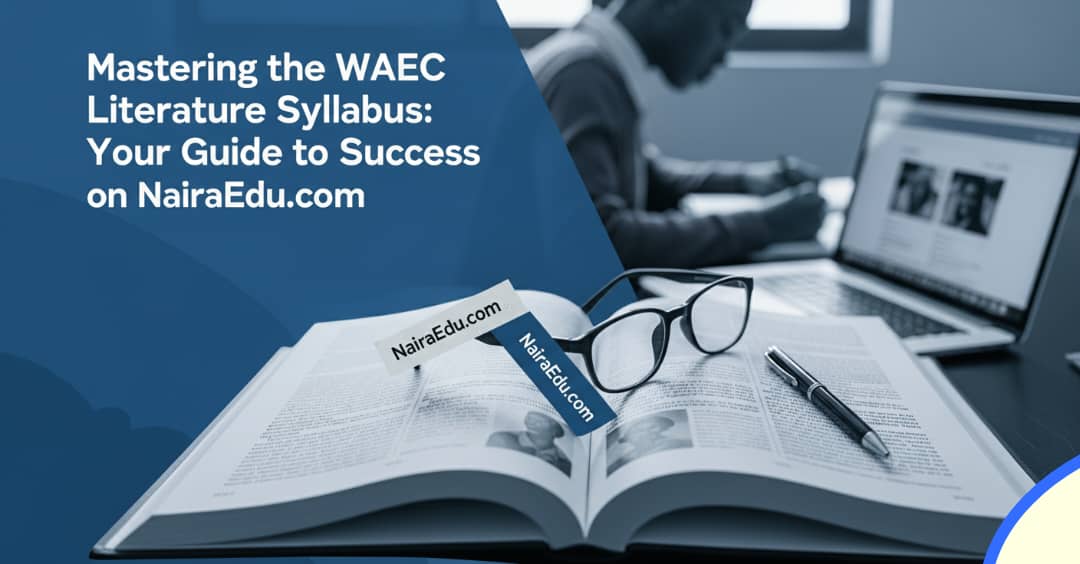Preparing for the WAEC Literature in English 2026 examination is a journey into the world of creative expression, human stories, and critical analysis. The WAEC Literature syllabus is your essential roadmap, detailing the specific texts you must read and the exam structure you will face.
At Nairaedu.com, we understand that this subject requires more than just reading, it demands a deep understanding of themes, characterization, and literary devices.
This guide provides a comprehensive breakdown of the entire syllabus. We will outline the exam format, list the prescribed texts for prose, drama, and poetry, and offer key tips to help you prepare effectively.
By following this roadmap, you will be well equipped to analyze, interpret, and write compelling essays that will earn you an excellent grade.
WAEC Literature in English Examination Scheme
The examination consists of three papers, all of which are a composite paper and are taken at one sitting. Knowing the format of each paper is crucial for effective time management and targeted preparation.
Paper 1: Objective Test
Format: 50 multiple-choice questions.
Duration: 1 hour.
Marks: 50 marks.
Breakdown:
- 20 questions on general knowledge of literature (e.g., literary terms, figures of speech).
- 5 questions on an unseen prose passage.
- 5 questions on an unseen poem.
- 20 questions on context from the prescribed Shakespearean text.
Paper 2: Prose Essay Test
Format: Essay test with two sections: Section A (African Prose) and Section B (Non-African Prose).
Duration: 1 hour and 15 minutes.
Marks: 50 marks.
Breakdown:
- Two essay questions are set for each of the prescribed novels.
- Candidates are required to answer one question from each section, for a total of two essays.
Paper 3: Drama and Poetry Essay Test
Format: Essay test with four sections: A (African Drama), B (Non-African Drama), C (African Poetry), and D (Non-African Poetry).
Duration: 2 hours and 30 minutes.
Marks: 100 marks.
Breakdown:
- Two questions are set for each of the prescribed drama texts.
- Two questions are set for each of the poetry sections.
- Candidates must answer one question from each of the four sections, for a total of four essays.
ALSO READ: WAEC Syllabus for English Language 2026
The 2026 Prescribed Texts: A Detailed Breakdown
The core of your preparation lies in a deep and comprehensive study of the prescribed texts. Here is a breakdown of the novels, plays, and poems you must master for the examination.
African Prose
- Second Class Citizen by Buchi Emecheta: This is a powerful novel that follows the journey of Adah, a young Nigerian woman who struggles with gender inequality and societal expectations. It explores themes of feminism, racism, and the clash between African and British cultures. Adah’s resilience in the face of immense adversity makes this a compelling story.
- Unexpected Joy by Alex Agyei-Agyiri (2018 Edition): Set in Ghana, this novel delves into themes of political instability, corruption, and the consequences of moral decay. The story follows a protagonist who faces personal and national turmoil, highlighting the search for truth and justice in a complex society.
Non-African Prose
- Invisible Man by Ralph Ellison: A seminal work of American literature, this novel chronicles the journey of an unnamed Black narrator who grapples with his identity in a society that refuses to see him as an individual. Key themes include racism, identity, and the disillusionment of the African-American experience in the 20th century.
- Wuthering Heights by Emily Bronte: This classic Gothic novel tells the turbulent and passionate love story of Catherine Earnshaw and Heathcliff. Set on the windswept English moors, the book explores themes of revenge, class conflict, and the destructive nature of obsession.
Shakespearean Text
For the 2026 examination, the prescribed Shakespearean play is A Midsummer Night’s Dream.
Note on Shakespearean Questions: It is crucial to remember that only context questions will be set on this text in Paper 1. You will not be asked to write an essay on it. The questions will test your knowledge of the plot, characters, setting, and style by providing a short excerpt from the play.
African Drama
- Let me Die ALone by John K. Kargo: This play explores the conflict between tradition and modernity in a rural African setting. It delves into the themes of leadership, community expectations, and the role of women in society.
- The Lion and the Jewel by Wole Soyinka: A masterful play by the Nobel laureate, this comedy-drama pits traditional values against modern progress. The story follows the rivalry between a young, educated schoolmaster, Lakunle, and the traditional chief, Baroka, over the village belle, Sidi. Themes include the clash of cultures, pride, and societal change.
Non-African Drama
- Fences by August Wilson: Set in the 1950s, this play is a powerful examination of the African-American experience. It follows Troy Maxson, a former baseball player who struggles with his past and present circumstances. The play explores themes of family, racism, betrayal, and the pursuit of the American Dream.
- Look Back in Anger by John Osborne: This play is a classic of modern British theatre. It captures the disillusionment of post-war youth through the character of Jimmy Porter, a discontented and angry young man. It delves into themes of class, marriage, and social frustration.
African Poetry
You must study the following five poems, focusing on their themes, imagery, literary devices, and the poet’s message.
- “Raider of the Treasure Trove” by Lade Qosrnu
- “Black Woman” by Leopold Sedar Senghor
- “The Grieved Lands” by Agostinho Neto
- “The Song of the Women of my Land” by Oumar Farouk Sesay
- “A Government Driver on his Retirement” by Onu Chibuike
Non-African Poetry
For this section, you must conduct a detailed study of the following six poems:
- “The Good Morrow” by John Donne
- “Caged Bird” by Maya Angelou
- “The Journey of the Magi” by T.S. Eliot
- “Do not Go Gentle into the Good Night” by Dylan Thomas
- “Binsey Poplars (Felled 1879)” by G.M. Hopkins
- “Bat” by David H. Lawrence
Unseen Passages: Prose and Poetry
Paper 1 will test your ability to read and analyze unseen passages. The prose passage will be between 120-150 words. This section evaluates your skills in comprehension, interpretation, and literary analysis without prior knowledge of the text. To prepare, practice reading various short passages and poems and answering questions about their themes, tone, and figurative language.
Expert Study Tips for WAEC Literature in English
- Read Everything, More Than Once: To truly master the prescribed texts, read each novel, play, and poem at least twice. The first reading is for comprehension, while the second is for analysis.
- Master the Basics of Literary Analysis: Familiarize yourself with literary terms like theme, characterization, plot, setting, point of view, and figurative language (e.g., metaphor, simile, personification).
- Use a Study Guide: For complex texts like those by Shakespeare or Soyinka, a study guide can provide valuable context, summaries, and analyses that deepen your understanding.
- Practice Your Essay Writing: For Papers 2 and 3, writing is key. Practice answering past questions under timed conditions to improve your speed and structure. Aim for a clear introduction, well-developed body paragraphs, and a strong conclusion.
- Don’t Neglect Unseen Passages: Dedicate time to practicing unseen prose and poetry. This is a crucial skill that can significantly boost your overall score in Paper 1.
By using this guide and adopting these study strategies, you will be well-prepared to achieve an outstanding result in your WAEC Literature in English exam. For more study materials and resources, visit Nairaedu.com.
ALSO READ: WAEC Syllabus for Mathematics 2026
Download the WAEC Literature in English Syllabus PDF
For your convenience, here is a link to the complete official syllabus that you can download and study offline.
Literature-in-English-SyllabusDOWNLOAD PDF

Mr. Femi is an education blogger who simplifies exam updates and study tips for Nigerian students. His goal is to make learning smart, easy, and rewarding.


1 thought on “WAEC Literature in English Syllabus 2026”